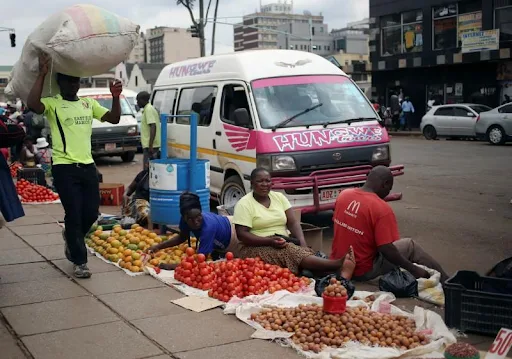By Thabisani Dube
From the crowded pavements of Zimbabwe’s cities and towns, from Harare, where the scent of roasted maize drifts through the air, to the dusty bus ranks of Mutare echoing with the clang of handcarts and the hum of commuter buses, a powerful informal force sustains Zimbabwe’s cities. That force is the street vendor, an everyday face of economic resilience in a country where formal employment has become the exception, not the norm.
According to the Zimbabwe National Chamber of Commerce (ZNCC)’s 2024 Annual State of Industry and Commerce Survey, Zimbabwe’s tertiary institutions produce approximately 30,000 graduates annually, yet less than 20 per cent are absorbed into the formal job market, leaving thousands to seek alternative livelihoods.
The informal economy, is often misunderstood or overlooked by development actors. Yet its role in poverty alleviation is growing. According to the UN Population Fund, by 2030 nearly five billion people will live in cities, mostly in Africa and Asia, making informal economies central to urban survival and inclusive development.
‘’In Zimbabwe, the informal economy is really the engine of a lot of economic growth,’’’ said Harare Residents Trust director, Precious Shumba.
While men and women participate in informal work, women are disproportionately represented in lower-income segments. Many single mothers, widows, and grandmothers rely on vending to support extended families. The government’s National Development Strategy 1 (2021–25) acknowledges the economy’s structural regression, marked by de-industrialisation and informalisation.
Women face additional challenges: limited access to officials, vulnerability to violence, and costly cross-border trips to source goods from South Africa, Botswana, and Zambia. In interviews with New Ziana, women described the informal economy as a “nut that hadn’t yet been cracked.”
Roadside furniture makers, curio sellers, cross-border traders, mechanics, and artisanal miners are key players. Instead of suppressing informal trade, government and development partners must better target support towards those working in it.
From Harare to Victoria Falls, vendors like Tafadzwa Nyoni from Borrowdale, Harare, Chenai Mudzamiri from Mutare, Bhekimpilo Sibanda from Makokoba, Bulawayo, and Nomathemba Phiri from Gweru in Midlands Province represent Zimbabwe’s educated yet economically sidelined majority.
“Pirating is what pays rent,” says Nyoni, a marketing graduate now driving Indrive taxis in Harare.
Mudzamiri explains, “I wake up at 4am, buy stock from the farms, and sell all day.”
Sibanda recalls, “When the hardware store I was working in closed, I started selling phone accessories on the pavement.”
Phiri shares, “I’m vending to pay school fees for my two children. My husband left for South Africa and hasn’t been in touch.”
At Mbare Musika Market, the government is reconstructing a modern three-story complex to accommodate at least 10,000 traders, following the October 2024 fire. Vendors returned within days, selling tomatoes, dried kapenta, and road runner chickens under gazebo tents. Many hold formal qualifications but rely on vending for sustainable income.
In July 2025, the Glen View Area 8 Home Industry Complex—one of Zimbabwe’s largest informal furniture hubs was ravaged by fire, destroying over US$2 million worth of property and affecting 700 traders. President Emmerson Mnangagwa declared the site a state of disaster, unlocking emergency resources and fast-tracking reconstruction.
Across towns like Gweru, Chinhoyi, Kariba, and Beitbridge, pavement stalls and pop-up markets have overtaken designated vending zones. Yet vendors are often viewed as illegal occupants. In Chitungwiza, traders near Makoni Shopping Centre and C-Junction reported losing merchandise during the municipality’s 2025 enforcement of prohibition and demolition orders. Some said their stock was never officially recorded, raising concerns about transparency.
In Victoria Falls, vendors see tourists as both opportunity and risk. “We try to sell crafts, fruit, even airtime,” says Nkosilathi Dube. “But when council officers come, they chase us away, sometimes violently.”
Councils struggle to regulate. Vending zones are often poorly located, lacking shade, toilets, and transport links. Research from the University of Zimbabwe’s Department of Rural and Urban Planning shows that informal economies especially street vending plays a vital role in sustaining livelihoods, particularly for women and youth.
Urban planning experts like Professor Innocent Chirisa and Joel Chaeruka advocate for zoning reforms, inclusive licensing, and participatory planning. In March 2025, the Ministry of Local Government instructed councils to clear illegal vending sites within 48 hours, citing sanitation and congestion concerns. Minister Daniel Garwe emphasised the need for designated spaces with toilets, water points, and security. Critics warn that formalisation may marginalise the poorest vendors—those unable to afford licences or meet zoning requirements.
Unlike Zimbabwe’s enforcement campaigns, Kenya’s Nairobi City County adopted a participatory model in 2022, creating vendor committees to co-manage trading zones and reduce conflict.
Local voices are calling for a shift from enforcement to empowerment. Vendors Initiative for Social and Economic Transformation (VISET) Director Samuel Wadzai believes reform must begin by recognising vendors as central to Zimbabwe’s urban economy.
“Street vendors are a vital part of Zimbabwe’s urban economy and livelihoods, and policy must recognise that reality,” he said.
He outlined practical steps: simplify registration and licensing; provide well-serviced trading spaces; ensure access to microfinance and digital payments; and develop policies in genuine partnership with vendor associations. Wadzai stressed gender sensitivity and scalable, evidence-based interventions.
In a nation grappling with inflation and youth unemployment, vendors embody grit and ingenuity. A future built with—not against—the informal heartbeat of our cities is not only possible, but essential.



